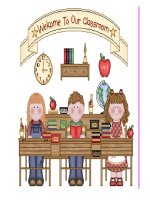UNIT 14 THE PAST TENSES
Bạn đang xem bản rút gọn của tài liệu. Xem và tải ngay bản đầy đủ của tài liệu tại đây (73.83 KB, 7 trang )
UNIT 14: THE PAST TENSES
I. Give the correct form of the verbs in brackets.
1. When I (turn)………………..the radio on yesterday, I (hear)……………….a song that was
popular when I was in high school. I (hear, not)…………………………………..the song in years,
and it (bring)……………………..back some great memories.
2. Sandy is in the living room watching television. At this time yesterday, she (watch, also)
……………………….. television. That's all she ever does!
3. Who you (talk)…………………on the phone as I came in? I (talk)………………..to Mr.Pitt.
4. He thanked me for what I (do)………………………………...
5. I (be)………………………………..sorry that I had hurt him.
6. By the time I got to the office, the meeting (begin, already)………………………………without
me. My boss (be)…………………….furious with me and I (be)………………….fired.
7. He died after he (be) ………………………………..ill for a long time.
8. She (have)…………………a bath while her sister (cook) ………………… dinner last night.
9. My friends (not see)………………………………..me for many years when I met him.
10. When I left the office, it was empty because everyone (go) …………………………….home.
11. The storm (begin)…………..at half past ten while the class (study) ………………… history
yesterday.
12. He (sit) ………………in the garden when an apple suddenly (fall)………..down before him.
13. He was late because he (have) ………………………………..an accident.
14. When I (arrive) …………………at his house, he (still, sleep) …………………..
15. The children (do) …………………..their homework when their father (come)…………… in.
16. When I (arrive)……………………………home last night, I discovered that Jane (prepare)
…………………………….a beautiful candlelight dinner.
17. I had to leave the house where I (spend) ………………………………..so many happy days.
18. You (take) …………………a nap when he …………………(call)?
19. By the time the doctor (arrive)………………at the house, the patient (die)………………….
II. Complete the dialogues, use the SIMPLE PAST or THE PAST CONTINUOUS in brackets.
* Situation A:
Policeman: What (you, do) (1)……………………….. when the accident ( happen ) (2)
………………………. yesterday?
Colin: I ( be ) (3)………………………at the bus- stop. I (wait) (4)………………………. for a bus.
Policeman: (you, see ) (5)………………………. the accident?
Colin: No, because I ( read ) (6)………………………. a newspaper..
* Situation B.
Nicola: I ( telephone ) (1)………………………. you at 9 o’clock last night but you was not at home.
Colin: 9 o’clock? I ( sit ) (2)………………………. in a cafe.
Nicola: ( be ) (3)………………………. Jane with you?
Colin: No, she ( work ) (4)………………………. in the library.
Nicola: Where ( you, go ) (5)………………………. after the cafe?
Colin: I ( go ) (6)………………………. home.
III. Complete the dialogue by putting the verbs in brackets into the SIMPLE PAST or PAST
PERFECT.
1
A: Where did you go last night?
B: I (go) (1)……………………… to a film show.
A: (be) (2)……………………… it good?
B: Yes, except the film. It (start) (3)……………………… before I (arrive) (4)………………………
A: Why?
B: Well, it (take) (5)……………………… me an hour to get there on the bus. By the time I (get) (6)
……………………… there, all the stars (go) (7)……………………… in, so I (not get) (8)
………………………any photographs. I (be) (9)………………………very disappointed. How
about you? You (enjoy) (10)………………………………... your evening?
A: No, I (spend) (11)……………………… my evening doing my homework. I (not finish) (12)
…………………when my sister (come) (13)…………………home from her party at mid-night.
IV. Choose the best answer to fill in the gap.
1. He…………on the bank fishing when he………….a man’s hat floating down the river.
A. had sat / had seen
B. was sitting / saw
C. sat / was seeing
D. was sitting / has seen
2. ……………Peter leave for London? Two weeks ago.
A. Why has
B. When did
C. Where will
D. What did
3. While they……………in the street, it rained.
A. are walking
B. have been walking
C. were walking
D. will be walking
4. Volunteer work has ranged from casual or regular assistance to community residents and family
members in ____, to more collective and organized efforts to better the quality of life of the
community.
A. request
B. search
C. need
D. want
5. By the time we………….at the party, everybody……….. .
A. will arrive / left
B. arrived / had left
C. had arrived / left
D. arrive / is leaving
6. Before he………….to London last week, Peter……….in Paris for 10 years.
A. moved / had lived B. was moving / lived C. would move / has lived D. has moved / was living
7. I……………….the flowers yesterday morning.
A. have been watering
B. watered
C. have watered
D. did watered
8. A: "Have you ever done any volunteer work?" - B: “____”
A. I'm doing a part-time job to support my student life.
C. Sure. When I was a student, I helped in the hospital.
B. You see, earning money is difficult these days.
D. I have been trying to work with all my heart.
9. My friend…………..when the lesson started.
A. has not arrived B. was not arrived
C. had not arrived
D. was not arriving
10.…………..they got to the airport, the plane had taken off.
A. After
B. By the time
C. Since
D. For the time
11. When they met again, they………….each other for five years.
A. do not see
B. have not seen
C. had not seen
D. will not have seen
12. This charity provides financial support and mental comfort to ____ children.
A. advantaged
B. disadvantaged
C. advantageous
D. disadvantageous
13. Alex did not come to see the film last night because he…………..it before.
A. saw
B. had seen
C. has seen
D. was seen
14. A student is talking to a volunteer organizer. Choose the best exchange to complete the
conversation:
Organizer: "Where do you want to volunteer?" - Student: “____”
2
A. I'm not really sure. What are my options?
B. You can either work in the garden or in the food pantry.
C. Thank you. I look forward to working with you.
D. What would I have to do?
15. He………..our company two years ago. He still……….for us.
A. joins / worked
B. joined / works
C. had joined / is working D. was joining / will work.
16. When the teacher entered the classroom, his students………..too much noise.
A. is making
B. made
C. were making
D. have made
17. You can ____ books, clothes, medicine and money to this charity.
A. donor
B. donate
C. devote
D. dedicate
18. Tina………….for London two years ago, and I…………from her since then.
A. left / have not heard
B. is leaving / had not heard C. is going to leave / do not hear
D. leave / are not hearing.
19. The teacher asked………….late for school.
A. why is Peter
B. Peter is why
C. why was Peter
D. why Peter was
20. She has a lot of ____ in this field, so she was offered the job.
A. contact
B. involvement
C. maturity
D. experience
21. It has been a long time since I………….my native village.
A. leave
B. have left
C. left
D. had left
17. She wishes that she…………to the party yesterday.
A. went
B. had gone
C. goes
D. has gone
18. At 9 a.m yesterday they…………their final examination.
A. are taking
B. have been taking
C. were taking
D. had been taking
V. Read the following passage and mark the letter A, B, C, or D to indicate the correct word or
phrase that best fits each of the numbered blanks.
With the support of volunteers, Mencap is able to help young people and adults live and
engage in everyday life, enabling them to enjoy more fulfilling activities and live (1) ____. With this
support young people and adults with a learning (2) ____ are able to engage in dedicated information
and communication technology (ICT) training and activities (3) ____ empower them with increased
(4) ____ and ability to use digital technology, have fun and improve their health and well-being. It
has also created a community of individuals (5) ____ both mainstream and learning disability
background (6) ____ would not usually be in the same social circle. This has had a real and
noticeable impact (7) ____ both groups, which includes enabling friendships to form and mutual
understanding to be gained. A good example of (8) ____ this has been done is through the joint club
in Lisnaskea where young people from the local community have joined the LiveNet club as peer
mentors, helping young people to learn together and feel part of (9) ____ one community. Key topics
(10) ____ as part of the club include e-safety and safe social networking, using ICT, having fun and
keeping healthy.
1. A. independent
B. independently
C. independence
D. dependent
2. A. ability
B. disability
C. abilities
D. disabilities
3. A. which
B. that
C. these
D. those
4. A. confident
B. confidential
C. confidence
D. confide
5. A. in
B. with
C. for
D. from
6. A. which
B. that
C. who
D. whom
7. A. to
B. in
C. for
D. on
8. A. what
B. how
C. where
D. when
9. A. this
B. that
C. the
D. its
3
10. A. to run
B. running
C. ran
D. run
VI. Read the following passage and mark the letter A, B, C, or D to indicate the correct answer
to each of the questions.
Clarissa Barton, called Clara, was born in 1821 in Oxford, Massachusetts. At a time when
relatively few women worked outside the home, Barton built a career helping others. One of her
greatest accomplishments was founding the American Red Cross. This organization helps victims of
war and disasters.
Clara Barton taught school for many years. In 1854, she moved to Washington, D.C., and took
a job in the government patent office. She was probably the first woman to hold a government job!
When the Civil War began in 1861, Barton volunteered. She gathered supplies to help feed and
care for wounded soldiers. She also served as a nurse. Barton possessed excellent organizing skills
and knew how to get things done. After the Civil War ended in 1865, Barton took on the job of
locating soldiers who were missing. She ran an office that tracked down information on nearly
22,000 men and contacted their families.
Barton took her organizational skills to Europe in 1869. She worked with the International Red
Cross to set up hospitals during the Franco-Prussian War (1870-1871) between France and Germany.
Barton returned to the United States in 1873.
The Red Cross was founded in Switzerland in the 1860s to care for wounded soldiers during
wartime. Nations agreed to follow its policies on the treatment of wounded soldiers by signing a
treaty. Barton spent years pushing the United States Congress to approve the International Red Cross
treaty. In 1881, she finally won support for creating the American Red Cross. Barton served as
president of the organization until 1904.
In 1884, Barton attended an International Red Cross conference in Switzerland. As a result of
her efforts, the Red Cross expanded its activities. From helping only victims of war, it began also to
help victims of peacetime disasters, such as earthquakes and floods.
Barton's efforts comforted people around the world. Red Cross aid helped people in need
during epidemics (outbreaks of disease), floods, famines, and war. Barton became famous for her
work.
Clara Barton died in Maryland at the age of 91. She had spent her life helping others.
1. Which of the following could be the best title for the passage?
A. Clarissa Barton B. the American Red Cross C. The Red Cross D. wounded soldiers
2. What did Clara Barton NOT do when she was alive according to the passage?
A. founding the American Red Cross
B. chairing Red Cross conferences
C. holding a government job
D. caring for wounded soldiers
3. The phase "tracked down" in the passage almost means ____.
A. gathered
B. analyzed
C. searched
D. stored
4. How long did Clara Barton work for the American Red Cross?
A. 7 years
B. 44 years
C. 24 years
D. 4 years
5. The word "comforted” in the passage almost means ____.
A. make someone feel less unhappy
B. help someone feel less disappointed
C. help someone realize their dreams
D. make someone believe in themselves
4
KEY
29. A: "Have you ever done any volunteer work?"
B: “____”
A. I'm doing a part-time job to support my student life.
B. You see, earning money is difficult these days.
C. Sure. When I was a student, I helped in the hospital.
D. I have been trying to work with all my heart.
30. A student is talking to a volunteer organizer. Choose the best exchange to complete the
conversation:
Organizer: "Where do you want to volunteer?" Student: “____”
A. I'm not really sure. What are my options?
B. You can either work in the garden or in the food pantry.
C. Thank you. I look forward to working with you.
D. What would I have to do?
Read the following passage and mark the letter A, B, C, or D to indicate the correct word or
phrase that best fits each of the numbered blanks.
With the support of volunteers, Mencap is able to help young people and adults live and
engage in everyday life, enabling them to enjoy more fulfilling activities and live (1) ____. With this
support young people and adults with a learning (2) ____ are able to engage in dedicated information
and communication technology (ICT) training and activities (3) ____ empower them with increased
(4) ____ and ability to use digital technology, have fun and improve their health and well-being. It
has also created a community of individuals (5) ____ both mainstream and learning disability
background (6) ____ would not usually be in the same social circle. This has had a real and
noticeable impact (7) ____ both groups, which includes enabling friendships to form and mutual
understanding to be gained. A good example of (8) ____ this has been done is through the joint club
in Lisnaskea where young people from the local community have joined the LiveNet club as peer
mentors, helping young people to learn together and feel part of (9) ____ one community. Key topics
(10) ____ as part of the club include e-safety and safe social networking, using ICT, having fun and
keeping healthy.
1. A. independent B. independently C. independence D. dependent
Trạng từ bổ nghĩa cho động từ
2. A. ability
B. disability
C. abilities
D. disabilities
Hợp ngữ pháp, ngữ nghĩa và ngữ cảnh
3. A. which
B. that
C. these
D. those
Mệnh đề quan hệ
4. A. confident
B. confidential
C. confidence
D. confide
Danh từ làm tân ngữ cho động từ
5. A. in
B. with
C. for
D. from
create from: tạo nên từ
6. A. which
B. that
C. who
D. whom
Đại từ quan hệ thay thế cho a community
7. A. to
B. in
C. for
D. on
impact on/influence on/effect on: có ảnh hưởng tới
8. A. what
B. how
C. where
D. when
5
Mệnh đề á danh làm bổ tố cho danh từ 'example’
9. A. this
B. that
C. the
D. its
Mạo từ xác định dùng để khẳng định tính thống nhất và duy nhất của 'community’
10. A. to run
B. running
C. ran
D. run
Hợp thời, hợp thể, hợp số, (hiện tại, chủ động, số nhiều)
IX. Read the following passage and mark the letter A, B, C, or D to indicate the correct answer
to each of the questions.
Clarissa Barton, called Clara, was born in 1821 in Oxford, Massachusetts. At a time when
relatively few women worked outside the home, Barton built a career helping others. One of her
greatest accomplishments was founding the American Red Cross. This organization helps victims of
war and disasters.
Clara Barton taught school for many years. In 1854, she moved to Washington, D.C., and took
a job in the government patent office. She was probably the first woman to hold a government job!
When the Civil War began in 1861, Barton volunteered. She gathered supplies to help feed and
care for wounded soldiers. She also served as a nurse. Barton possessed excellent organizing skills
and knew how to get things done. After the Civil War ended in 1865, Barton took on the job of
locating soldiers who were missing. She ran an office t=t tracked down information on nearly
22,000 men and contacted their families.
Barton took her organizational skills to Europe in 1869. She worked with the International Red
Cross to set up hospitals during the Franco-Prussian War (1870-1871) between France and Germany.
Barton returned to the United States in 1873.
The Red Cross was founded in Switzerland in the 1860s to care for wounded soldiers during
wartime. Nations agreed to follow its policies on the treatment of wounded soldiers by signing a
treaty. Barton spent years pushing the United States Congress to approve the International Red Cross
treaty. In 1881, she finally won support for creating the American Red Cross. Barton served as
president of the organization until 1904.
In 1884, Barton attended an International Red Cross conference in Switzerland. As a result of
her efforts, the Red Cross expanded its activities. From helping only victims of war, it began also to
help victims of peacetime disasters, such as earthquakes and floods.
Barton's efforts comforted people around the world. Red Cross aid helped people in need
during epidemics (outbreaks of disease), floods, famines, and war. Barton became famous for her
work.
Clara Barton died in Maryland at the age of 91. She had spent her life helping others.
1. Which of the following could be the best title for the passage?
A. Clarissa Barton B. the American Red Cross
C. The Red Cross D. wounded soldiers
Đọc các câu đề và/hoặc câu kết của các đoạn văn đều nhắc tới Clarissa Barton
2. What did Clara Barton NOT do when she was alive according to the passage?
A. founding the American Red Cross
B. chairing Red Cross conferences
C. holding a government job
D. caring for wounded soldiers
Thông tin từ các đoạn văn 2, 3, 4, 5, 6, 7 (Chú ý: In 1884, Barton attended an.
International Red Cross conference in Switzerland).
3. The phase "tracked down" in the passage almost means ____.
A. gathered
B. analyzed
C. searched
D. stored
6
Suy ra từ ngữ cảnh (After the Civil War ended in 1865, Barton took on the job of
locating soldiers who were missing. She ran an office that tracked down information on
nearly 22,000 men and contacted their families. Tim kiếm thông tin binh lính mất tích và
liên lạc với gia đình họ.)
4. How long did Clara Barton work for the American Red Cross?
A. 7 years
B. 44 years
C. 24 years
D. 4 years
Thông tin từ đoạn 5 (In 1881, she finally won support for creating the American Red
Cross. Barton served as president of the organization until 1904.)
5. The word "comforted” in the passage almost means ____.
A. make someone feel less unhappy
B. help someone feel less disappointed
C. help someone realize their dreams
D. make someone believe in themselves
Suy từ ngữ cảnh của từ (Barton's efforts comforted people around the world. Red Cross
aid helped people in need during epidemics (outbreaks of disease), floods, famines, and
war. Barton became famous for her work.)
7









